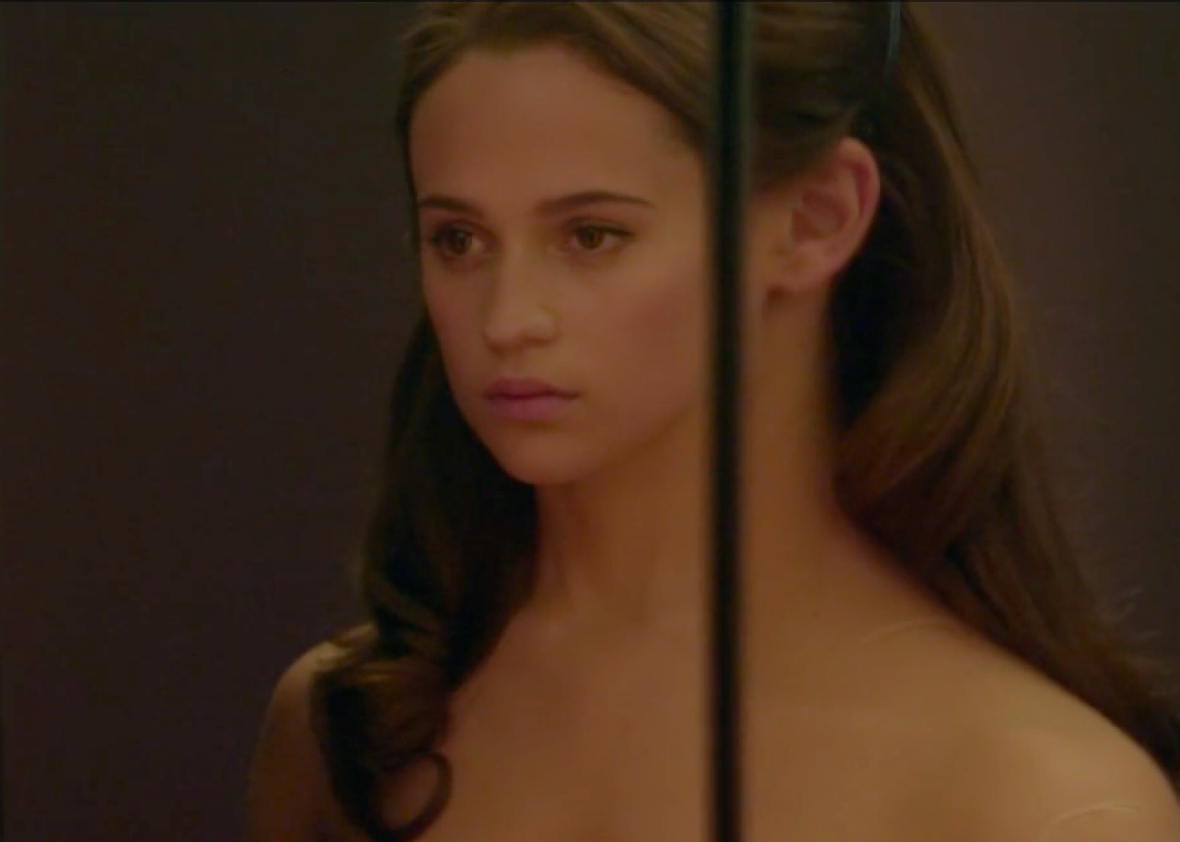As 2015 comes to a close, the Outward crew is in a reflective mood. In the spirit of honoring the past while boldly sashaying into the future, we will each offer a hymn of praise to the gayest thing we encountered this year. “Gayest,” in this case, is defined broadly and in the best possible sense—fabulous, delightful, glad-making, delicious, just too much, or otherwise pleasing. Join us by sharing the gayest thing you met this year in the comments or on social media.
Spoilers ahead.
For a movie about two men sequestered in a labyrinthine fortress in the jungle—convening for late-night, alcohol-fueled rendezvous and trying to one-up each other—Ex Machina presents as decidedly heterosexual. Alex Garland’s elegant techno-horror film concerns a moneyed software executive, Nathan (Slate’s beloved Oscar Isaac), who lures one of his bright-eyed employees, Caleb (Domhnall Gleeson), to perform a Turing test on an android he’s developed. Ava, the droid, has a slinky female frame and the face of Alicia Vikander, so not long after the test gets underway, the story takes on unsettling psychosexual dimensions. (“You bet she can fuck,” Nathan tells Caleb, inevitably.)
The gaze and (homosocial) gender politics in this movie are complicated and possibly meaningless. I lack the training to tell you if it has anything real to say about artificial intelligence; the conscious robot may well be a MacGuffin. But to me, the movie’s triumph comes after Ava convinces Caleb to set her loose. Her first order of business is to inspect the faces of her robo-predecessors on a wall, reaching toward them, a weirdly sensual spectacle of narcissism heightened when she encounters Kyoko, another stunning droid. She stares into Kyoko’s eyes, holds her hand, whispers something into her ear.
Once the men have been dispatched—it does not take long—the true show begins. Ava approaches a closet of beautifully manicured female parts. She puts on a luxurious wig. She snaps off her given frame, piece by piece, and twists on new additions. She stands naked, inspecting her new body in a series of mirrors, brushing herself with her fingers, and quietly flipping her hair.
One might reasonably read the scene as festhistic, but it also arrives squarely in the uncanny queer valley. There’s Ava’s piecemeal physical transformation, a preoccupation of queer bodies of all kinds, and also the more spiritual one: As Ava stares into the mirror, she sees herself changing into a rather fabulous creature she barely recognizes. Propelled by Geoff Barrow and Ben Salisbury’s gentle, almost childlike score, the sequence is a moving—and familiar—moment of sexual activation and self-discovery. After her hushed, erotic encounter with Kyoko and her droid forebearers, not to mention killing her master, Ava is becoming something else, and it’s clear she likes what she sees.
By the next scene, in an embroidered white dress, Ava literally marches into the light, leaving the compound for the first time. She walks out without looking back, including at the bloodied, screaming man she has locked forever in a glass dungeon. Bye! Even in a film year of lush queer glances, “culturally gay” actors, twisted dom-sub affairs, and inspirational eyeliner, Ava’s moment of transformative self-regard is the gayest thing I saw.
Other Gayest Things:
Kim Davis, the Diva Zealot
Tops & Bottoms
